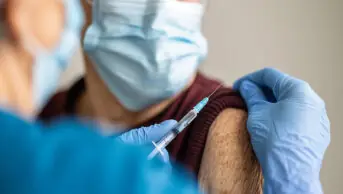
Shutterstock.com
Pharmacists working in developing countries are to be given training support as part of a £210m UK government funding package to help tackle antimicrobial resistance (AMR).
Announcing the investment on 16 August 2023, the Department of Health and Social Care (DHSC) said it would be working with countries across Asia and Africa over the next three years to bolster the AMR surveillance capacity in up to 25 countries where the threat and burden of AMR is highest, including Indonesia, Ghana, Kenya and Papua New Guinea.
As part of the package, which will be funded from the UK government’s aid budget, more than 250 laboratories will be upgraded and re-equipped. The investment will include new genome sequencing technology to help track bacterial transmission between humans, animals and the environment.
The DHSC said the investment will also “strengthen” the international health workforce in these countries by “supporting 20,000 training sessions for pharmacists, and hospital and laboratory staff, with over 200 Fleming Fund scholarships to boost expertise in microbiology, AMR policy and One health — which recognises the connection between humans, animals and the environment”.
The Fleming Fund is a charity that supports low- and middle-income countries to generate and use data to improve antimicrobial use and encourage investment in AMR.
The DHSC, which said that it is making the biggest investment in global AMR surveillance out of any country, added that AMR causes almost 1.3 million annual global deaths, with one in five of those deaths in children aged under five years.
“In 2019, AMR was found to have caused between 7,000 and 35,000 deaths in the UK alone,” the statement added.
Dame Sally Davies, the UK’s special envoy on AMR and former chief medical officer for England, said: “The UK’s Fleming Fund will continue to create real impact to tackle AMR and build pandemic preparedness on the ground across the world, using data to drive action and catalyse investment.
“This world-leading investment in AMR laboratories, workforce and systems is a vital contribution to realise our vision of a world free of drug-resistant infection,” she added.
Steve Barclay, UK health and social care secretary, said: “AMR is a silent killer which poses a significant threat to people’s health around the world and in the UK.
“It’s vital it is stopped in its tracks and this record funding will allow countries most at risk to tackle it and prevent it from taking more lives across the world, ultimately making us safer at home.”
Claire Machin, executive director, international policy and UK competitiveness, at the Association of the British Pharmaceutical Industry, said: “In the face of the daunting challenge posed by antimicrobial resistance, continued funding into this global issue remains a key priority. Advancing research, surveillance, and international collaboration on innovative solutions to combat AMR through a One health approach is essential.
“Commitments from both our industry and policymakers worldwide mean we can counteract the threat of AMR and secure the well-being of generations to come.”


